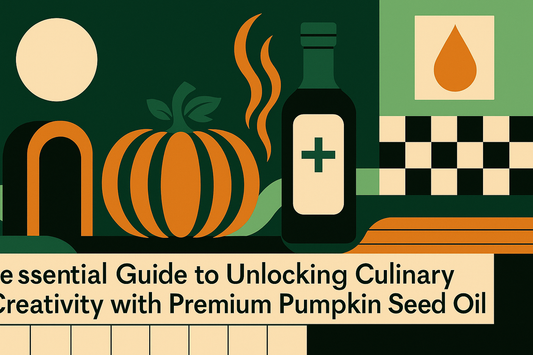
The Pumpkin Seed Oil vs Extra Virgin Olive Oil Debate: Choosing the Best for Your Health and Cuisine
Healthy cooking oils inspire both culinary creativity and wellness journeys. In today’s discussion, we explore a thoughtful comparison between pumpkin seed oil and extra virgin olive oil. By looking at their origins, nutritional profiles, flavors, and uses in the kitchen, this comparison helps unveil how each oil can find its rightful place in a natural wellness routine.
Overview of Pumpkin Seed Oil
Origin and Production Process
Pumpkin seed oil is crafted using carefully toasted pumpkin seeds, a method that distinguishes it from some other techniques. Rooted in a rich regional tradition originating from Slovenia, the process not only deepens its nutty flavor but also preserves the oil’s intrinsic qualities. Belvoro Pumpkin Seed Oil exemplifies this approach, emphasizing a commitment to authentic production that pays attention to detail.
Nutritional Profile
This oil is celebrated for its abundant supply of vitamin E, zinc, omega fatty acids, and powerful antioxidants. When considering a pumpkin seed oil nutritional comparison with olive oil, you will notice that its nutrient-rich formulation adds a unique nutritional boost to your meals.
Culinary and Lifestyle Uses
Known for its rich and distinctive flavor, pumpkin seed oil frequently enhances dishes as a final touch. It is ideal for drizzling over salads or incorporating into recipes that celebrate natural wellness, offering an elevated finish that meshes well with a wide range of culinary creations.
Overview of Extra Virgin Olive Oil (EVOO)
Production and Traditional Methods
Extra virgin olive oil is obtained from pressing ripe olives using time-honored practices. This traditional method preserves the oil’s inherent freshness and reinforces many of the extra virgin olive oil benefits that have been recognized for generations.
Nutritional Profile
Renowned for its high content of monounsaturated fats and polyphenols, extra virgin olive oil supports a balanced diet with its heart-healthy attributes. It is frequently highlighted as one of the healthiest cooking oils, making it a staple in countless kitchens.
Culinary Applications
The natural flavor of extra virgin olive oil makes it an excellent ingredient for dressings, sautéing, and myriad other cooking applications. Its ability to complement a host of recipes has cemented its status as a trusted choice across culinary traditions.
Comparison Between Pumpkin Seed Oil and Extra Virgin Olive Oil
Nutritional Comparison
When comparing pumpkin seed oil vs extra virgin olive oil, the nutritional differences become apparent. Pumpkin seed oil brings essential elements such as zinc, vitamin E, and omega fatty acids to the table, while extra virgin olive oil is a rich source of healthy monounsaturated fats and polyphenols. Both oils have their own strengths, with the pumpkin seed oil nutritional comparison with olive oil highlighting a unique blend of micronutrients that contribute to a balanced diet.
Taste and Aroma
The flavor profiles of these oils set them apart in the kitchen. Pumpkin seed oil delivers a deep, nutty taste that can transform a simple dish into an extraordinary culinary experience. In contrast, the fruity notes of extra virgin olive oil, sometimes accompanied by a mild pepperiness, create a fresh and engaging character that many appreciate.
Culinary Applications
In the realm of cooking, each oil shines in its own right. Pumpkin seed oil is especially suited as a finishing touch, imparting a robust depth of flavor when drizzled over dishes just before serving. Extra virgin olive oil, on the other hand, plays an indispensable role in everyday cooking, whether it be for dressings or light frying. Both choices serve as exemplary additions to a kitchen focused on healthy cooking oils.
Production Process and Unique Qualities
The distinct production methods behind these oils contribute significantly to their unique qualities. The toasted extraction method used in pumpkin seed oil not only enhances its nutty flavor but also reflects a regional heritage, as seen in Belvoro Pumpkin Seed Oil. Meanwhile, the traditional pressing of extra virgin olive oil preserves a clean, aromatic profile that has been cherished for centuries. Understanding these differences can be key to selecting the oil that aligns with your culinary goals.
Decision Guidance
The choice between pumpkin seed oil and extra virgin olive oil hinges on your taste preferences and cooking habits. If you are drawn to a pronounced, nutty character and desire an oil that complements finely finished dishes, pumpkin seed oil is an exceptional choice. Conversely, if you seek a dependable oil for everyday use that enriches a variety of recipes, extra virgin olive oil is well suited to that role. Experimenting with both oils may offer a delightful way to enjoy the various qualities each healthy cooking oil brings to your table.
Conclusion
In summary, both pumpkin seed oil and extra virgin olive oil contribute unique benefits and memorable flavors to your cooking repertoire. Reviewing aspects such as nutritional content, taste, culinary uses, and production methods can assist in making an informed decision. Belvoro Pumpkin Seed Oil is a standout option for those interested in a meticulously produced oil that honors its regional roots. As you navigate your choices, consider the distinct attributes of each oil to enrich your natural wellness journey with thoughtful, delicious selections.
FAQ
Q1: What are the main nutritional differences between pumpkin seed oil and extra virgin olive oil?
A1: Pumpkin seed oil is rich in zinc, vitamin E, and omega fatty acids, whereas extra virgin olive oil is celebrated for its high concentration of healthy monounsaturated fats and polyphenols.
Q2: How do their distinct production methods impact the flavor and benefits of each oil?
A2: The toasted process used for pumpkin seed oil imparts a deep, nutty flavor and helps preserve specific nutrients. In contrast, the traditional pressing of extra virgin olive oil retains a fresh, fruity profile that many appreciate.
Q3: Which oil is more suitable for certain cooking applications?
A3: Pumpkin seed oil is excellent as a finishing oil or when a pronounced nutty flavor is desired, while extra virgin olive oil is ideal for everyday cooking methods, dressings, and light frying. Both oils are valuable additions to any kitchen.
Explore further natural solutions and allow your culinary curiosity to guide you toward a richer dining experience.



